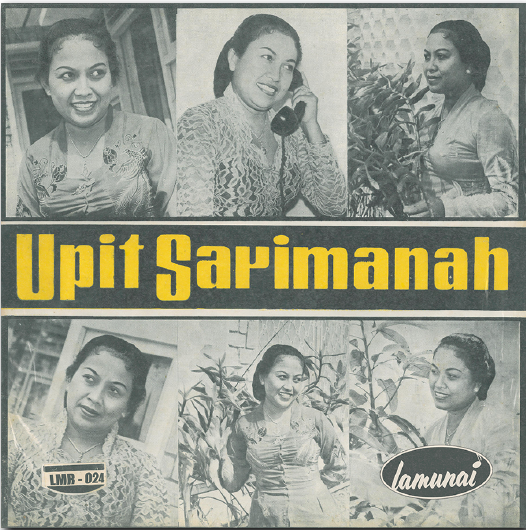For connoisseurs of classical Sundanese music, rich with the textures of gamelan, ketuk tilu, and the delicate strums of ketcapi, the name Upit Sarimanah resonates like a timeless refrain. Her voice, both grounded in tradition and emotionally transcendent, remains a pillar of West Java’s musical heritage.
Upit Sarimanah was born on 16 April 1928, in the 50s, she became an Indonesian Sinden that brought Sundanese songs, mainly known for her song Mojang Priangan. In the year 1941, Upit was actively participated in arts events at Nederlandsch-Indische Radio Omroep Maatschappij (NIROM) Jakarta. After the handover of power in 1950, she became a mainstay singer at Radio Republik Indonesia (RRI), and in 1969 was appointed to lead Seni Sunda RRI Jakarta until she retired in 1984.
In this self-titled album, the sound of Upit Sarimanah is not only a musical vessel, but a medium of emotions, where old wounds flow together with the absurdity of the times. With a rich cultural background and sensitivity to minor languages, Upit Sarimanah presents vocals that are not just sung, but thrown like a mantra, vibrating between spirituality and social reality.
As someone who grew up in the midst of diverse languages and identities, she absorbs the complexity of everyday life and turns it into poetry, clashing logic with intuition, inviting listeners into unusual sound spaces, at times obscure, at times bright, but always sincere.
The second track Sambatan Sakadang Kuja is a quintessential track in the album as it naturally embodies the message portrayed in the album. In Sambatan Sakadang Kuja, a story unfolds where a person’s inner journey in search of the meaning of life, freedom, and self-acceptance, set against a backdrop of stress and a desire to return home, both physically and spiritually. There is a longing for homecoming and origins, lines like “kuring keeng hayang balik” which translates to I really want to go home, are the emotional core of the song, a sense of wanting to return to a peaceful place, perhaps literally to one’s hometown or symbolically to their true self. There is also a life full of pressure and inner turmoil, seen in the lines “Sememerek diperkasah”, “Naraya ku bisa muka pendandang”, and “Dabungan hirup nyungkul ati” whichgive the impression of a burden, conflict, and deep mental struggle that dives deep into symbols of nature and local. Not only that, there are also symbols of nature and local spiritually evident in the lines “Dukung-dukung amis daunah” and “Gergelis sehade lapangan” which presents a beautiful Sundanese landscape but also imply the irony of natural beauty that is not in harmony with the chaotic human mind.
This self-titled album explores endless themes such as the search for life, respect for local culture and communities, the spirit of spirituality and religious metaphors, absurdist and experimental styles, all while navigating a rich, multi-layered emotional and cultural landscape—blending traditional Sundanese musical heritage. Many lyrics feature existential confusion, found in lyrics “asa suumbat, asa jamur” and “aku ingin pulang”. This shows an individual who is lost in a confusing world and wants to return to their roots or clarity. In terms of respect towards culture and communities, songs such as Haleuang Abdi are full of locality and togetherness. There is also the use of Sundanese language and references to places that strengthen cultural identity. Not only that, the spirit of spirituality and religious metaphors are mentioned, words like “Katuhanan nung Maha Esa”, “jemita merdekaan abadi”, or “aku tak sumpah” give a message within a search for spiritual values in the midst of hustle and bustle of life. Furthermore, the album provides an absurdist and experimental style. Through surreal imagery and occasional linguistic fragmentation, the album embraces the absurdity of the human condition, using it to reflect the disconnection between outer stability and inner disorder—clashing logic with intuition, tradition with modernity, possibly inspired by Dadaism or avant-garde styles.
Upit Sarimanah doesn’t just perform, she testifies. Her voice carries the emotional memory of generations, becoming a vessel through which both personal and collective trauma, beauty, and resilience are conveyed.
“Upit Sarimanah” is now streaming across all digital platforms and available on vinyl via La Munai Records.”

